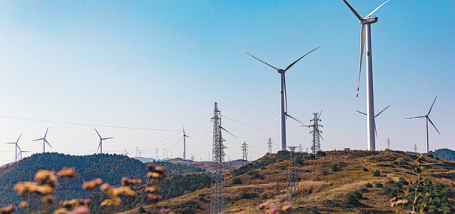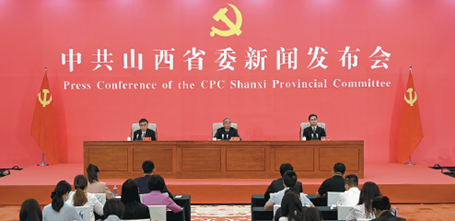
Wind power is a pillar of the new energy industry in Fanshi county, Shanxi province. [Photo by Li Zhaomin for China Daily]
GDP nearly doubled between 2012-21 as energy production and innovation skyrocketed
Shanxi's economic transformation has proven to be a great success over the past decade, especially in ensuring a stable energy supply to the country, promoting high-quality and sustainable local growth and improving the local environment and people's livelihoods, according to Lin Wu, secretary of the Shanxi Provincial Committee of the Communist Party of China.
Lin made the remarks during a news conference held on Aug 10 in the Shanxi provincial capital of Taiyuan, which introduced the North China province's remarkable achievements during the past 10 years since the opening of the 18th National Congress of the CPC in 2012.
Lin started his address to the media by sharing impressive numbers.
"Shanxi saw its annual GDP nearly double from 1.17 trillion yuan ($172.34 billion) to 2.26 trillion yuan during the 2012-21 period," Lin said.
He added that the per capita annual disposable income of urban residents increased from 20,232 yuan to 37,433 yuan, while that of rural residents grew from 7,064 yuan to 15,308 yuan during the same period.
Lin said he is proud that Shanxi announced the elimination of absolute poverty in 2021.

Provincial officials attend a news conference of the CPC Shanxi Provincial Committee in Taiyuan on Aug 10. [Photo by Li Lianjun for China Daily]
Shanxi is among the most important suppliers of energy to the country. Over the past decade, the province produced a total of 10 billion metric tons of coal, accounting for about one-fourth of the country's total output, according to Lin. As a majority of the output had been delivered to the rest of the country, Shanxi has played an irreplaceable role in safeguarding the nation's energy security.
The senior provincial official noted that Shanxi's coal output neared 1.2 billion tons in 2021, accounting for about one-third of the country's total. It produced 641 million tons in the first half of this year and numbers for the entire year are likely to surpass 1.3 billion tons.
"We have signed medium and long-term agreements with major power plants in the rest of the country, ensuring they are provided with at least 620 million tons of coal a year in total, with rational prices agreed to," Lin said.
The official noted that the steady growth of coal supply was made as Shanxi has implemented an economic transformation that aims to achieve sustainable, high-quality development by reducing its reliance on coal and fostering emerging industries as new growth engines.
"Our economic transformation targets will not be achieved by simply reducing the output of coal," Lin said. "The process involves strengthening emerging industries to increase their ratio in the overall economy and upgrading traditional industries toward high efficiency, digitalized operations and low-carbon, environmentally friendly development." The province is steadily diversifying and upgrading its coal industry by integrating coal mining with power generation, developing coal-based chemicals and new materials, as well as digitalizing its industrial chain, according to Lin.
He said making coal cleaner and turning it into new materials represent a new direction in its use. The new solutions in this aspect include coal liquefaction, and developing methanol, hydrogen, graphene and other new materials.
Shanxi is one of the nation's leaders in coal-mining digitalization. It is now upgrading 42 coal mines and 1,500 mining shafts into 5G-connected, intelligent operations.

A picturesque mountain view in Shanxi [Photo by Liu Liangliang for China Daily]
"While stabilizing and upgrading the coal industry, Shanxi has been putting more emphasis on fostering new growth engines by developing emerging industries," Lin told the media.
The official said the high-tech industry is viewed as one of most important drivers.
"In 2021 alone Shanxi saw the establishment of 365 high-tech enterprises and entities, including three national-level laboratories," Lin said. "More than 1,400 high-tech professionals have been attracted to the province." One of the important bases for high-tech development is the fledgling Taiyuan-Xinzhou Integrated Economic Zone in the center of Shanxi, which was founded in December 2021.
In March, the integrated economic zone held a groundbreaking ceremony for 183 large projects. Funded by businesses from across the country, most of the industrial projects there are related to such high-tech industries as advanced equipment manufacturing, integrated circuits and semiconductors.
"The Taiyuan-Xinzhou Integrated Economic Zone, which links the provincial capital of Taiyuan and its northern neighbor of Xinzhou, will serve as another economic powerhouse in central Shanxi along with the Shanxi Transformation and Comprehensive Reform Demonstration Zone," Lin said.
The Shanxi Transformation and Comprehensive Reform Demonstration Zone, founded in 2016, is an earlier development area between Taiyuan and Jinzhong in its south. With a planned area of 600 square kilometers, this is the largest and the leading development zone in Shanxi province.
"Now the two zones will become twin engines to support the high-quality development of city cluster in central Shanxi," Lin said.
In the process of economic transformation, Shanxi is becoming an inland hub of opening-up in China. This ambition is materializing with the operation of nine international cargo train routes linking to Europe, Central Asia and Southeast Asia. "Shanxi's higher level of opening-up is also evidenced by the increasing number of enterprises funded by overseas businesses," Lin said. "Among the global top 500 companies, 137 now have operations in the province."
Shanxi's increasing economic strength as a result of its transformation makes it possible to invest heavily in undertakings including environmental protection and livelihood improvement for its people, according to Lan Fo'an, governor of Shanxi, who was at the news conference.
Guo Yanjie contributed to this story.
